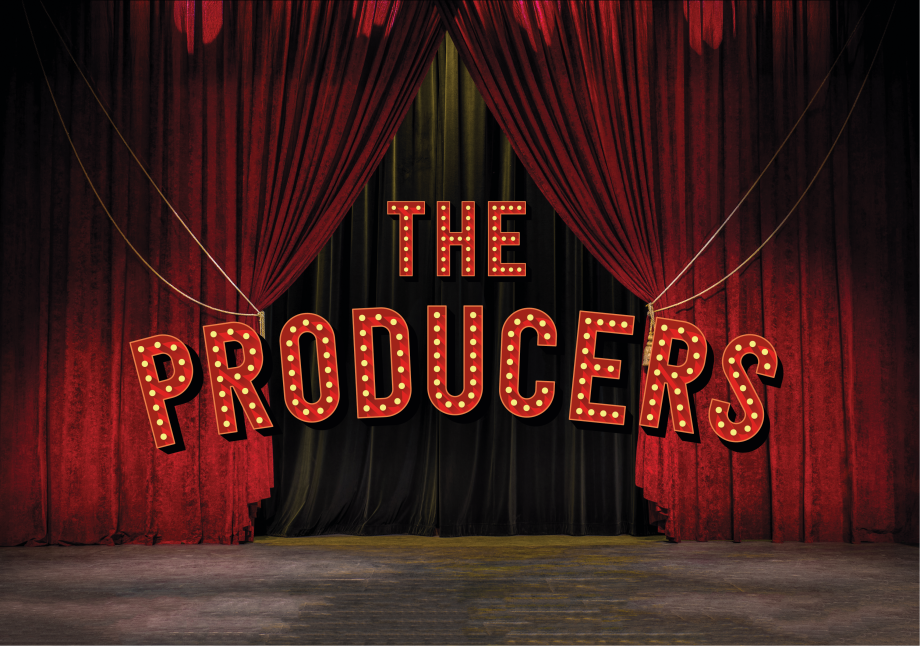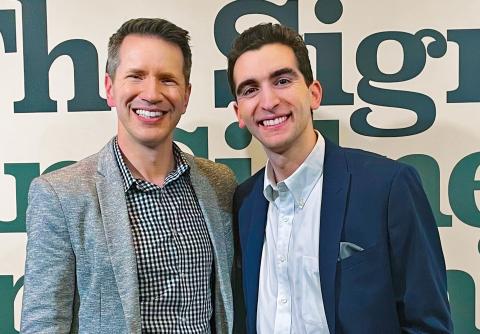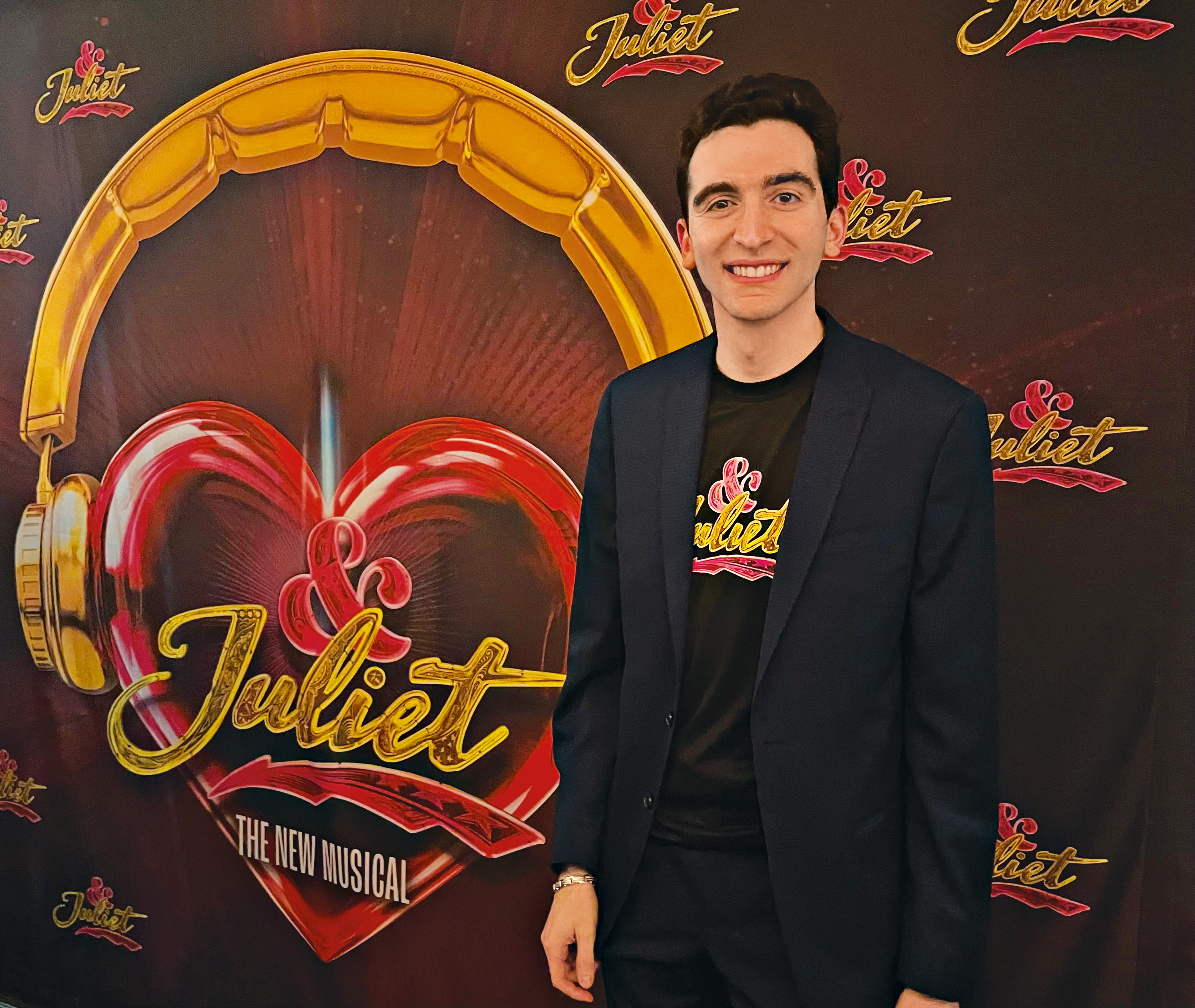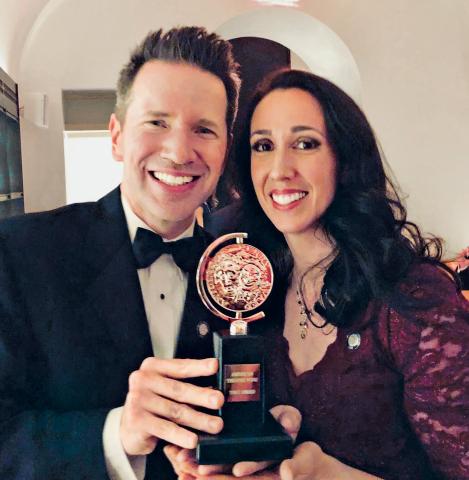The Producers
Two Alumni Help Launch Several Broadway Shows

Marc Hershberg’s first producing credit was the Law School Musical in 2016. His second, which opened on Broadway last year, was a Tony-nominated hit—& Juliet—a fun and progressive jukebox spectacle.
The path from law student to Broadway producer might be an unusual one, but Hershberg, ’17, found his way there in part because another Law School graduate, Phil Kenny, ’06, had already paved the way.
Kenny said that he first got into acting to meet girls, starring in Oklahoma at his Nebraska high school and then in Carousel as an undergraduate. And it worked: Kenny saw a young woman in My Fair Lady. Nine months later he married her. Knowing they wanted to have a big family (the couple now has seven children, ages 6 to 20), Kenny decided law school was a sensible path. His initial trajectory was what one would expect from a UChicago Law grad—a stint at Gibson, Dunn & Crutcher, and then a move into technology work in his own Palo Alto-based firm, Arcus Law. But theater still allured him—and friends suggested he invest in a show.
“At first I was very hesitant; I felt like I was really smart with my money,” he said.
But Kenny dipped a toe in, making a small buy into a touring production of Matilda. Next, he and his wife combined funds with some friends to hit the $25K minimum to be an investor in the Broadway productions of An American in Paris and Something Rotten.
That was a turning point, garnering the Kennys a pair of tickets for opening night. At the after party, the couple met as many fellow investors as they could. They then proposed something new: instead of each investing $25,000, what if these investors pooled their funds and invested as a group? That meant leveraging both their money and their network to go beyond what many of them could do solo.
“Everyone I talked to loved the idea,” Kenny said. And so 42nd.club—named for the iconic Broadway street—was born in 2015.
Hershberg was still at the Law School at that point, but already something of a Broadway savant. As a child growing up on Long Island, he regularly attended musicals with his parents, becoming a devoted fan. Then, as an undergraduate at Cornell, he unleashed his analytical skills in an honors thesis project to discover what made shows successful. He created a linear regression model predicting the number of performances of Broadway productions, and it proved eerily accurate, predicting when a show would close within seven performances of when it actually happened. Hershberg’s work garnered the attention of the trade publication Variety, which published a story about his analysis.
In Hershberg’s second year at the Law School, he approached Professor Douglas Baird about overseeing an independent study project to write a book on white-collar crime and Broadway. Hershberg’s source pulled out of the project, killing it, but not before he learned a ton about producing.
“We went through [the source’s] entire story about acquiring the rights and financing and everything,” Hershberg said.
He still needed the independent study credit, so he pivoted and pitched himself to Forbes as a columnist covering the business of Broadway. For his first piece, he interviewed Kenny and wrote about 42nd.club, which he called a “matchmaking service for hopeful producers and investors.”
Today Hershberg and Kenny work together. And 42nd.club now includes nearly 200 members. Membership is free, although members who want to invest in shows are required by the US Securities and Exchange Commission to be “accredited investors” with an annual income of $200K or more, or assets north of $1 million. Each investor can decide whether to invest in any given production. Shows including 42nd.club as a producer have won 52 Tony Awards. In 2023, seven shows on Broadway were funded and produced by the club.
“It is very high risk, high reward type investing,” said Kenny. “Something could become the next Book of Mormon or Wicked—or it could also completely lose its investment.”
The pandemic made the game even harder, thanks to inflation and changing audience tastes.
“It is insanely more expensive—many millions more. What used to be a $13-, $14-million show is now a $20-million show,” said Kenny.
That means changing the model for picking shows in which to invest. Kenny typically requires one of three qualifications: a familiar title, like Beetlejuice or Moulin Rouge, which means a built-in audience; a star-driven show featuring someone with the power to draw crowds, such as Hugh Jackman or Samuel L. Jackson; or a deafening buzz, from readings or other locales, including London or Toronto.
& Juliet arguably hits all three criteria. Shakespeare lovers would swoon for something linked to Romeo and Juliet. The story centers around familiar songs by hit-maker Max Martin, who has written well-known and loved songs for artists including Katy Perry, Britney Spears, Bon Jovi, and Celine Dion. Then Kenny and Hershberg tested the buzz themselves, flying up to see the show in Toronto.
“I had to witness it myself and feel like, ‘Is this really going to do it? Is it going to go the distance?’” he said.
They were convinced, and members of 42nd.club raised $300K to make 42nd.club an above-the-title producer (just below the lead producers, who typically serve as the show’s CEO/COO).
So far, their bet appears to be paying off.
“It’ll be a very profitable show. It has all the signs that it’s recouping and doing everything that we’d hoped it would do at this point,” Kenny said.
“It’s the best performing new musical in the season,” added Hershberg in an interview at a Hell’s Kitchen diner on the afternoon of the Tony Awards.
That night did not turn in & Juliet’s favor, however. Despite nine nominations, the show went home without a single win, which Billboard called the biggest snub of the evening. Still, 42nd.club-produced shows won statuettes, including the coveted title of Best Revival for Parade.
But the money keeps coming for & Juliet. Soon after the Tonys it earned a record $1,401,919 in a single week, the most the show had ever earned in a eight-show performance week.
Kenny is quick to acknowledge that not all his bets have been winners. 42nd.club hit it big with Hadestown and Moulin Rouge, both best musical winners, but King Kong, which featured expensive special effects, was a hard loss. “I learned that it would be very difficult to recoup $35 million at that moment in time,” Kenny said.
But the satisfaction of the wins makes up for that. Biggest for Kenny was when Once on This Island stunned the Tonys in 2018, knocking out My Fair Lady to take Best Revival. Winning seemed like such a long shot that Kenny and his wife eschewed the pricey orchestra seats and bought balcony tickets. Then he ran into a lead producer who told him that The New York Times had just come out with a poll of likely voters putting Once on This Island within the margin of error. Just before the winner was announced, the Kennys walked down and stood in the back of the theater, ready to go on stage if the show won.
“I’m nervous… I’m pacing around… I’m sick to my stomach. I’m like, ‘Oh my gosh: Could this really happen?’” Kenny recalled thinking.
When they read the winner, “we were just out of our minds,” Kenny said. It was the couple’s first Tony win.
Hershberg’s magical moment came at the after party on & Juliet’s opening night when Max Martin thanked him for believing in him and the show. “I was like, ‘Are you serious?’ I’m one of his biggest fans… & Juliet is the perfect show for me because I grew up listening to these songs. His music is the soundtrack of my life. It was a wild experience.”
Both men credit their Law School education for making producing a reality. Kenny points to the credibility that the UChicago name provides when he is working to attract investments in chunks of $25K or $50K for shows.
“I think it would have been impossible to go down that path without that background,” said Kenny.
“If anybody is going to moneyball Broadway, I’m not surprised that it’s UChicago students.”
M. Todd Henderson
Hershberg, whose day job is working as an entertainment lawyer, points to the analytical training.
“Being University of Chicago graduates, I think we’re more analytical than some other producers—really digging into the numbers because of the economic analysis of the law. I feel like we’re more inclined towards that sort of analysis. I probably wouldn’t be the same way had I gone to another school.”
Baird, the Harry A. Bigelow Distinguished Service Professor of Law and a former Dean of the Law School, remembers Hershberg’s independent study project fondly and believes that exposure to Broadway’s darker side will continue to serve his protégé well.
“I had this really delightful year in which I was supervising and being a cheerleader for these very interesting pieces on Broadway theater. It was an incredibly fun, memorable episode in my teaching career that you wouldn’t ordinarily associate with a bankruptcy guy. The one thing I can say is that the level of mischief and illegality and fraud and double dealing that he was writing about actually prepared him well.”
A professor Kenny remembers as particularly influential was M. Todd Henderson, the Michael J. Marks Professor of Law. Henderson told students it was folly to believe they could out-invest the market and those with greater expertise, who do this work day in and day out. “You’re delusional,” Henderson warned.
Now, Kenny realizes that when it comes to theater, he is the expert investor.
“I actually believe that one of my superpowers is that I come from red states. I lived in Nebraska most of my life, and then lived in Utah. I kind of know what my dad would come out and see.”
Henderson isn’t surprised at Kenny’s unusual path, nor at the idea that UChicago grads would be successful in this endeavor.
“I mean, if anybody is going to moneyball Broadway, I’m not surprised that it’s UChicago students,” Henderson said. “We’re data people. We’re empirical people. We’re kind of cynical about the typical stories for things and why they work,” said Henderson. “That’s very much our approach.”
As much as he likes producing, Kenny’s true dream is to see a show he has written staged. For years he has been working with a cowriter on Alice in Neverland, a sequel to Alice in Wonderland and a prequel to Peter Pan, which he hopes might be produced on Broadway in about two years.
In the meantime, Kenny and Hershberg invite other Broadway lovers to join their club.
“If there are lawyers out there who are big fans of theater, I say, ‘Reach out to us,’” Kenny said. “Come join in the fun. We’re having a blast.”
Christine Foster is a freelance writer based in Durham, Connecticut.


